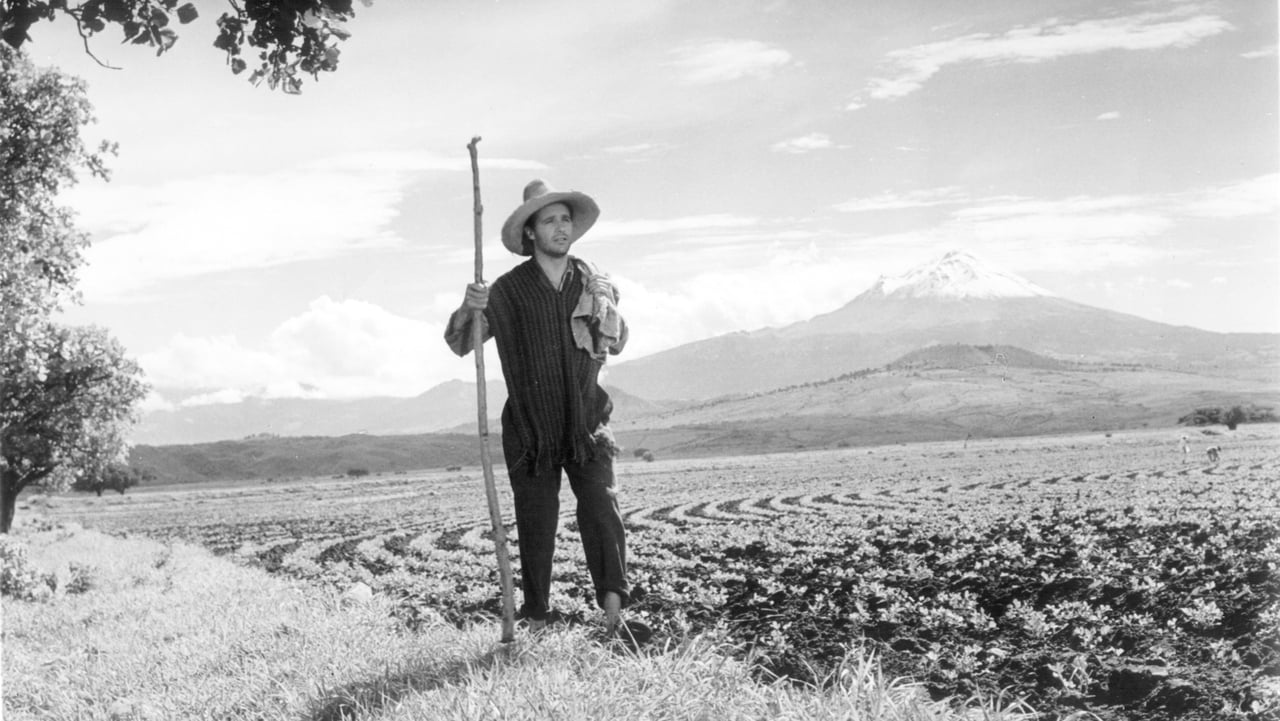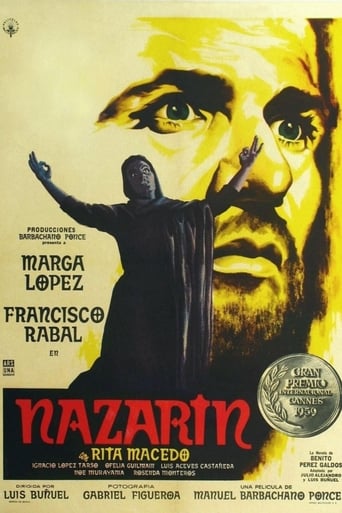

A priest (Francisco Rabal) in a poor community lives a charitable life in accordance with his religious principles, but many others do not return the favor.There are two things that really stood out for me with this title. One, if I am not mistaken, Bunuel had a rocky relationship with Catholicism. Yet, here the priest is the hero, and in no facetious or false way. He truly lives a good life, a devout life, and is helpful to his fellow man. He is an inspiration to us all.Second, Francisco Rabal is amazing and really drives this film. He starred in three films directed by Buñuel - "Nazarín", of course, but then later "Viridiana" (1961) and "Belle de jour" (1967). Interestingly, William Friedkin thought of Rabal for the villain of "The French Connection" (1971). However, he could not remember the name of "that Spanish actor". Mistakenly, his staff hired another Spanish actor, Fernando Rey. Friedkin discovered that Rabal did not speak English or French, so he decided to keep Rey. Rabal had previously worked with Rey in "Viridiana". Rabal did, however, work with Friedkin in the much less successful but Academy Award-nominated cult classic "Sorcerer" (1977), a remake of "The Wages of Fear" (1953).
... View MoreIn a poor and backward community in Mexico, the Catholic Priest Nazario (Francisco Rabal) follows the Christian principles and lives a humble life without possessions in an old hostel owned by Chanfa (Ofelia Guilmáin) and used by prostitutes. When the prostitute Andara (Rita Macedo) kills he coworker Camilla that had stolen her buttons of shells, she is wounded and seeks shelter with the priest. Meanwhile, the disillusioned dweller of the hostel Beatriz (Marga López) is lured by her boyfriend Pinto (Noé Murayama) and tries to commit suicide. However, Chanfa convinces her to return to her village. When the police discover that Andara is hidden in the room of Nazario, she flees and Nazario undresses his cassock and wanders in the poor countryside, helping the destitute and begging for food. When Nazario reaches a very poor village, he meets Beatriz that is living with Andara and asks him to help a child that is very ill. Nazario prays for the child and on the next morning she is healed. Andara and Beatriz believe he is a saint and become his followers. Along their journey, Nazario and Andara are arrested and the priest is humiliated and beaten by common people and by the church."Nazarin" is an ironic criticism to the hypocrisy of church and society by Luis Buñuel. Francisco Rabal has an awesome performance in the role of a priest that lives in accordance with the principle of the catholic apostolic roman church and is betrayed, humiliated and hated by the people that he helps and by the church that he serves. One of my favorite sequences is when Nazario is protected by a criminal in jail and the man concludes that Nazario is a good man, he is a murderer and they are in the same place. My vote is seven.Title (Brazil): "Nazarin"
... View More"Nazarin" directed by Luis Bunuel presents an extraordinary view of religion in Mexico. As written by the director and Julio Alejandro, his notable collaborator, this was a film that put Mexican cinema in the international map after receiving the Grand Prix in Cannes that year. It's a disturbing film because Mr. Bunuel delves deep into what's wrong with the church.Nazarin, by all reckoning, is a saint. This young priest is seen living a life of poverty in a seedy pension of a city. He doesn't have enough for himself, but he doesn't mind parting with a coin when a beggar appears by his window asking for help. At the same time, he takes into his small room a prostitute that has been hurt in a fight with another woman. Andara, the woman repays his kindness by burning the room and the whole building! Nazarin is seen taking to the countryside begging for food. Andara and Beatriz, two prostitutes from his old town follow him. Nazarin's life parallels that of Jesus. In fact, this saintly figure makes a case for humility.Of course,Mr. Bunuel had no religion in mind when he and Mr. Alejandro took it upon themselves to create this film. It's ironic how Spain welcomed him after this film was released because they saw it as showing Christian qualities, when in reality, this is an acerbic satire on the catholic church and its ministers.Francisco Rabal, the Spanish actor, makes a wonderful Nazarin. This was one of his best roles. Mr. Rabal worked extensively in his native country, but also in Mexico and Argentina. Rita Macedo, as Andara, is also excellent. Marga Lopez also makes a valuable contribution with her portrayal of Beatriz.A great film by one of the cinema's master film makers: Luis Bunuel.
... View MoreLuis Bunuel has always been a filmmaker whose work was obscure to me. My first experience with him was The Discreet Charm of the Bourgeosie, often considered his greatest work, with which I became so frustrated and bored that I eventually shut the tape off. Likewise Belle de Jour, which is almost certainly his best known film and also generally considered one of his many masterpieces, didn't interest me very much at all. I didn't hate it like I did Discreet, but I didn't like it. Third, I saw L'Age d'Or. Finally, I had gotten somewhere. Fourth, Los Olvidados, also good. Still, neither L'Age d'Or nor Los Olvidados blew me away. Great films, but not masterpieces. Nazarin is my fifth Bunuel, and I like it just a tad more than those other two. It is about a priest from Spain now in Mexico who refuses to live in the kind of luxury most priests live in. He wants to be more like Jesus, leading the meekest life possible. He's also willing to forgive everyone for anything, and to suffer without protest. I'm pretty sure Bunuel does not sympathize with the character, and sees him as rather self-righteous. However, I only assume that because of my knowledge of the director, whose most famous quotation is "Thank God, I'm still an atheist," which he apparently said in an interview over this very film (I get this information from John Baxter's book about Bunuel, if you're interested). The interviewer who dragged those words from Bunuel's mouth must have been himself confused about Nazarin. One who was more predisposed to believe in religious conviction, who also knows nothing about Bunuel, might see the priest as a heroic figure. This is especially true if that viewer has his/her own criticisms of organized religion. The priest may be somewhat self-righteous, but he seems to be basically a good man. When he harbors a violent prostitute in his room in order to protect her (and, presumably, to save her soul), people begin to find out and assume that their relationship is sexual. His superiors assume the same and punish him for it. Later on, he suffers even worse punishments from clerics.
... View More